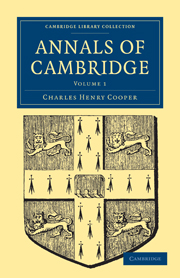Book contents
- Frontmatter
- Contents
- FABULOUS HISTORY
- THE BRITONS AND ROMANS
- THE SAXONS AND DANES
- WILLIAM THE CONQUEROR
- WILLIAM RUFUS
- HENRY THE FIRST
- STEPHEN
- HENRY THE SECOND
- RICHARD THE FIRST
- JOHN
- HENRY THE THIRD
- EDWARD THE FIRST
- EDWARD THE SECOND
- EDWARD THE THIRD
- RICHARD THE SECOND
- HENRY THE FOURTH
- HENRY THE FIFTH
- HENRY THE SIXTH
- EDWARD THE FOURTH
- HENRY THE SIXTH RESTORED
- EDWARD THE FOURTH RESTORED
- EDWARD THE FIFTH
- RICHARD THE THIRD
- HENRY THE SEVENTH
- HENRY THE EIGHTH
- Frontmatter
- Contents
- FABULOUS HISTORY
- THE BRITONS AND ROMANS
- THE SAXONS AND DANES
- WILLIAM THE CONQUEROR
- WILLIAM RUFUS
- HENRY THE FIRST
- STEPHEN
- HENRY THE SECOND
- RICHARD THE FIRST
- JOHN
- HENRY THE THIRD
- EDWARD THE FIRST
- EDWARD THE SECOND
- EDWARD THE THIRD
- RICHARD THE SECOND
- HENRY THE FOURTH
- HENRY THE FIFTH
- HENRY THE SIXTH
- EDWARD THE FOURTH
- HENRY THE SIXTH RESTORED
- EDWARD THE FOURTH RESTORED
- EDWARD THE FIFTH
- RICHARD THE THIRD
- HENRY THE SEVENTH
- HENRY THE EIGHTH
Summary
1216.
1216–17
After Christmas, Lewis the dauphin of France called his followers to a council at Cambridge, whilst the governors of the infant King convened a similar council at Oxford. The object of these assemblies was the conclusion of a peace, or a prolongation of the truce; but no terms were agreed upon.
1217.
1217–18
A writ tested at Stoke on the 17th of February, was directed to the Sheriff, commanding him to cause all such clerks as had been excommunicated for their adhesion to Lewis the son of the King of France, and who had not been absolved, to depart the realm before the middle of Lent; and to arrest all such as should not so depart.
If (as seems very probable) the word clerk is used in this writ as denoting a scholar, this appears to be the earliest authentic legal instrument referring to the existence of a University at this place.
1218.
On the 3rd of November a writ was directed to the Barons of the Exchequer, requiring them to allow the Bailiffs of Cambridge £26 3s., laid out about the King's expences at Cambridge.
1219.
This year, died David earl of Huntingdon and Cambridge, who by the title of Earl David was in the receipt of the annual rent of £10, as the third penny of the town of Cambridge.
- Type
- Chapter
- Information
- Annals of Cambridge , pp. 37 - 53Publisher: Cambridge University PressPrint publication year: 2009First published in: 1845



